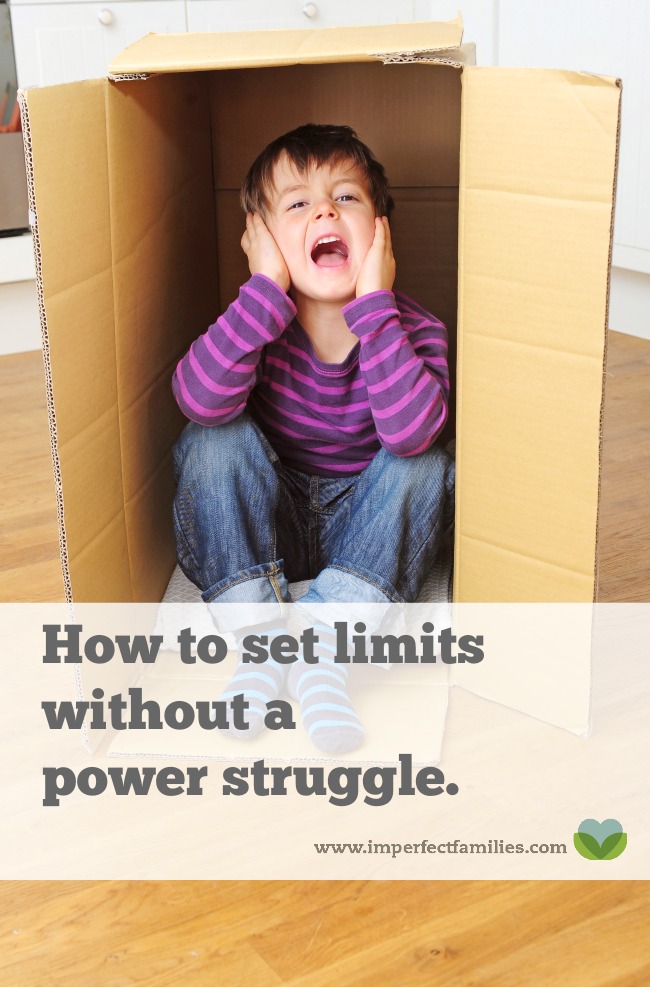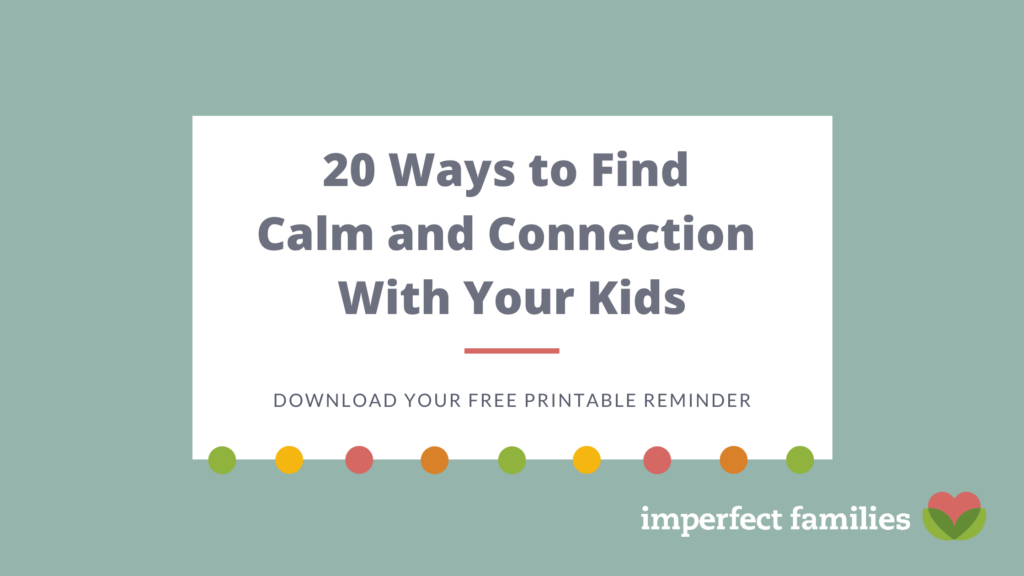Turning off the Ipad, getting dressed, taking out the trash…if power struggles are a daily occurrence in your home, it’s time to try something new. These step-by-step scripts will help you use positive parenting when setting limits (they even with strong-willed kids!).

Wouldn’t it be nice if your kids just did what they were told, when they were told, without all of the power struggles?
It’s like every parent’s best daydream. Ahhh….can’t you just imagine it?
While there is no magic wand to create this peaceful interaction 100% of the time, there are a lot of positive parenting strategies that just might make your life a little easier.
One of the most effective strategies is learning how to set firm limits and empathize with our child’s reactions.
Setting Limits with Empathy
Many people mistake positive parenting as passive parenting; where the parents sit quietly on the couch while the kids run around doing whatever they please. Instead, part of positive parenting is about setting firm limits with empathy and respect.
- Describe what you see or hear: “It looks like you’re frustrated with your lego set.”
- Set a limit: “We do not throw toys when we are frustrated.”
- Offer another option: “Can you use your words to ask for help?”
If you have worked with your child on frustration tolerance and he already knows a more appropriate phrase, he might say, “Can you please help me get these pieces apart?” And, the crisis is over.
But, in the real world. It’s often very different.
If he continues to throw toys, repeat the limit and set another firm boundary:
- Describe what you see or hear: “You are still throwing toys.”
- Set a limit: “It’s OK to be mad, but We do not throw toys.”
- Give a boundary: “It looks like the legos will need to be put away for now.”
Of course, your child may still be upset…you took away their toy after all! But, since you’re setting limits with empathy, you can understand how hard it is when your feelings are overwhelming and you make a choice that you regret.
Related: How to Use Empathy To Disengage From a Power Struggle
What if things don’t end there?
At this point, your child may become even angrier, beg for you to change your mind or cry.
Here’s where the empathy part really kicks in! Empathy doesn’t mean you agree with your child, but that you can put yourself in the child’s shoes and understand where they are coming from at this moment. You probably don’t think taking the legos away is a big deal, but to him, you realize that it’s the end of the world!!
If your child is even angrier*:
Your child has a right to be upset. You do not have to punish the response! Expecting your kids to be happy when you set a limit is unrealistic. Instead, they need help getting their anger down to size. If your child responds with disrespectful language or hurtful words, another limit may need to be set.
- Empathize: “You don’t like that the legos are put away.”
- Set a limit: “You can be angry, and I’m going to help you not to hit me when you’re mad.”
- Focus on connection: “Do you want to sit with me for a few minutes before you find something else to do?”
*If you feel that your child’s anger is often too big, it is impacting them at school or affecting friendships, you may want to seek help from a mental health professional who can teach frustration tolerance and coping skills.
If your child begs you to change your mind:
Once a limit has been set, your child may “flip” back into compliant behavior. This can be confusing for parents. So much parenting advice focuses on being consistent and following through but it’s not always a clear decision. (You might feel like giving the toys back to reward their compliance or just to keep the peace!)
If you decide to stand firm with your limit, use empathy as your response:
- Empathize: “I can see that you stopped screaming. You would really like me to give you your legos back now. Time for legos is over, you are welcome to play with them again later.”
- Brainstorm solutions: “I know you wish you didn’t throw those legos when you were mad. Can you think of a different way to tell me that you need help?”
- Focus on connection: “That is a good plan. You have some great ideas to try next time.”
If your child starts to cry:
If your child breaks down into tears when you set a firm limit, it is actually a good thing! Getting to tears means that your child is accessing the feelings that are usually masked by anger. Some parents see this as a sign of manipulation, weakness or over-sensitivity. Instead, I would challenge you to see it as a positive sign that your child feels comfortable enough with you to show his true self.
Like the above situations, responding with empathy is key here too.
- Empathy: “Wow, those are some big tears! You are really sad right now!”
- Focus on connection: “Do you want to cuddle with me for a few minutes before you find something else to do?
Three tips to make setting limits successful.
- Don’t fear their reaction. It is ok for your kids to show emotions – even anger, sadness or frustration. Often, parents fuel a power struggle by responding back with anger and heaps of punishment. I love Dr. Laura Markham’s mantra, “It’s not an emergency.” This phrase has been so helpful to keep my mind calm at the moment instead of responding with anger.
- Short and sweet is key: Lecturing, giving lengthy responses, or attempting to rationalize with a child during a power struggle is a losing battle. You do not need to respond to every accusation or complaint flung at you during an argument. Keep your responses short and focus on being firm, empathetic and connecting.
- Your job is to stay calm. Your job is not to keep your child from engaging in a power struggle, your job to stay out of the power struggle. You are the adult. Your brain is fully formed and you are capable of maintaining self-control. This is a challenge for a lot of parents. If this is a struggle for you, I encourage you to seek support and learn strategies to use in the heat of the moment.
Read More: What to Do When Your Kids Argue About Everything
Even with the best scripts, setting limits is part of parenting.
Thankfully, it doesn’t have to be done with aggression or threats.
Responding with empathy can decrease the intensity and limit the number of power struggles you have with your kids.
And that is a step in the right direction.
Need More Support?
If this seems all well and good for other people, but like it would never work for you, let’s talk. I offer online parent coaching to help you achieve your parenting goals. Get more information about Parent Coaching and schedule an appointment today!




Comments have been turned off to retain the privacy of all families. If you have a question or comment on the topic, you're always welcome to contact me.